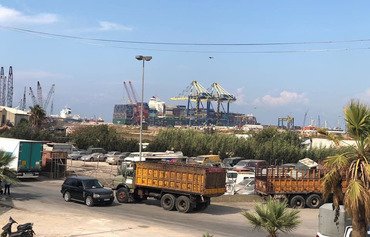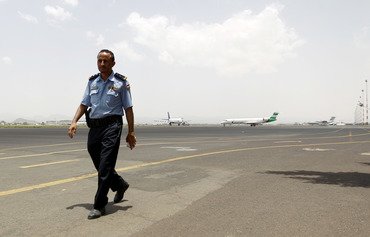Yemen's transport sector, which includes sea ports, airports and overland transportation, has incurred enormous losses as a result of the war, Yemeni officials told Al-Mashareq.
This has compounded the suffering of the Yemeni people, they said, as this sector serves as a lifeline in many ways, from providing jobs to delivering goods.
Losses incurred by the transport sector since the outbreak of conflict in March 2015 amount to close to $2.5 billion, the Ministry of Transport revealed in a mid-October report.
The air transport sector has incurred the greatest damage and losses, around $1.5 billion, while the maritime transport sector lost an estimated $900 million and land transport losses amounted to about $11.7 million, the report said.
The report attributed these losses to the full or partial destruction of a number of transport sector installations and facilities in Yemen, including sea ports, airline agencies and companies, airports and ground transportation facilities.
"The heaviest damage and losses were primarily concentrated in the air transport sector, as it is the largest, with affiliated infrastructure such as airports and airline companies," said Deputy Minister of Transport Abdullah al-Ansi.
This is compounded by loss of revenue to the State Treasury, which has had an adverse effect on the national economy, he told Al-Mashareq.
"Air transport sector losses approached $1.52 billion," he said.
Losses in this sector include the damage sustained by six airports: Sanaa, Aden, al-Hodeida, Taiz, Saada and Ataq, he noted, "leading to a 60% decline in airport activity and 95% decline in non-aviation activities".
This is in addition to $200 million in losses Yemeniya Airways sustained, he said.
Maritime sector losses amounted to close to $1 billion, al-Ansi added, due to the destruction of a large quantity of equipment and installations at al-Hodeida and al-Makha ports.
This will require repairs estimated to cost $90 million for al-Hodeida port and $60 million for al-Makha port, he said.
Long-term impact
"The series of losses continue," said Mazen Ghanem, director general of air transport at the Civil Aviation and Meteorological Authority.
He called for all parties to the conflict to reach an agreement, with the help of the UN, in order to "stop the mounting losses that have negatively impacted the infrastructure to the point that it cannot be returned to normal overnight".
Damage to Yemen's transportation sector will require years of work and huge sums of money to repair, he said, which will require international assistance.
In addition to the destruction of equipment, Ghanem said, close to 80% of workers in the transportation sector lost their jobs as a result of the conflict.
This has contributed to higher poverty rates, he said.
Air transport also is a "lifeline for the transport of medicine, medical supplies and emergency aid needed by Yemen", he said, in addition to necessary goods.
Meanwhile, losses incurred by the land transport sector amounted to about $12 million, due to damage to General Authority for Land Transport Affairs facilities, said authority chairman Walid al-Wadei.
This included, in particular, "the destruction sustained by buildings and facilities at the [Harad] land port in Hajjah province and destruction of the Alab land port in Saada province," he told Al-Mashareq.
These land ports sustained damage because "they became battle zones, being located on provincial borders", al-Wadei said.
Ports are a lifeline
"Ports and airports are the Yemeni people’s lifeline, since Yemen is a country that imports 90% of its food," said economist Abdul Jalil Hassan.
Consequently, he told Al-Mashareq, damage to these facilities affects all of Yemen and compounds human suffering.
About 13 UN aid ships are still unable to dock due to the hampered ability of the al-Hodeida port to receive these vessels, he said.
"This has an adverse effect on the displaced and poorest segments who await food aid," Hassan said.
The commercial sector also has suffered heavy losses due to the increase in insurance costs to shipping companies, he said, as well as fines incurred by the sector as ships await at sea to unload their cargo.

![Yemen's al-Hodeida port has sustained severe damage due to the war, which has sparked a decline in the country's transport sector. [Photo courtesy of the Ministry of Transport]](/cnmi_am/images/2016/11/14/6559-Yemen-hodeida-port-600_384.jpg)






